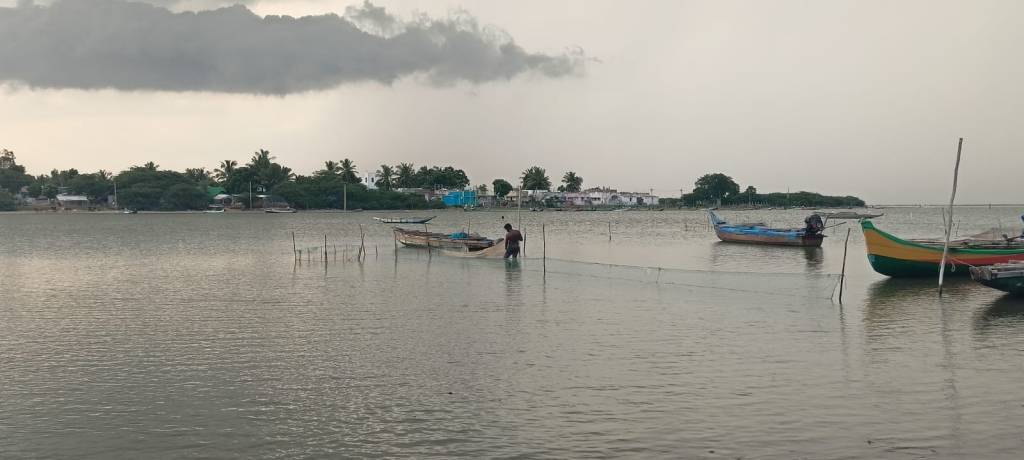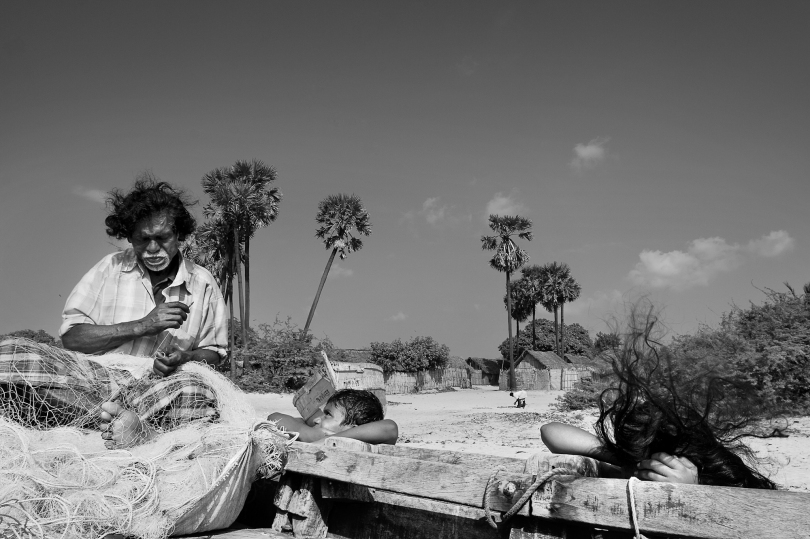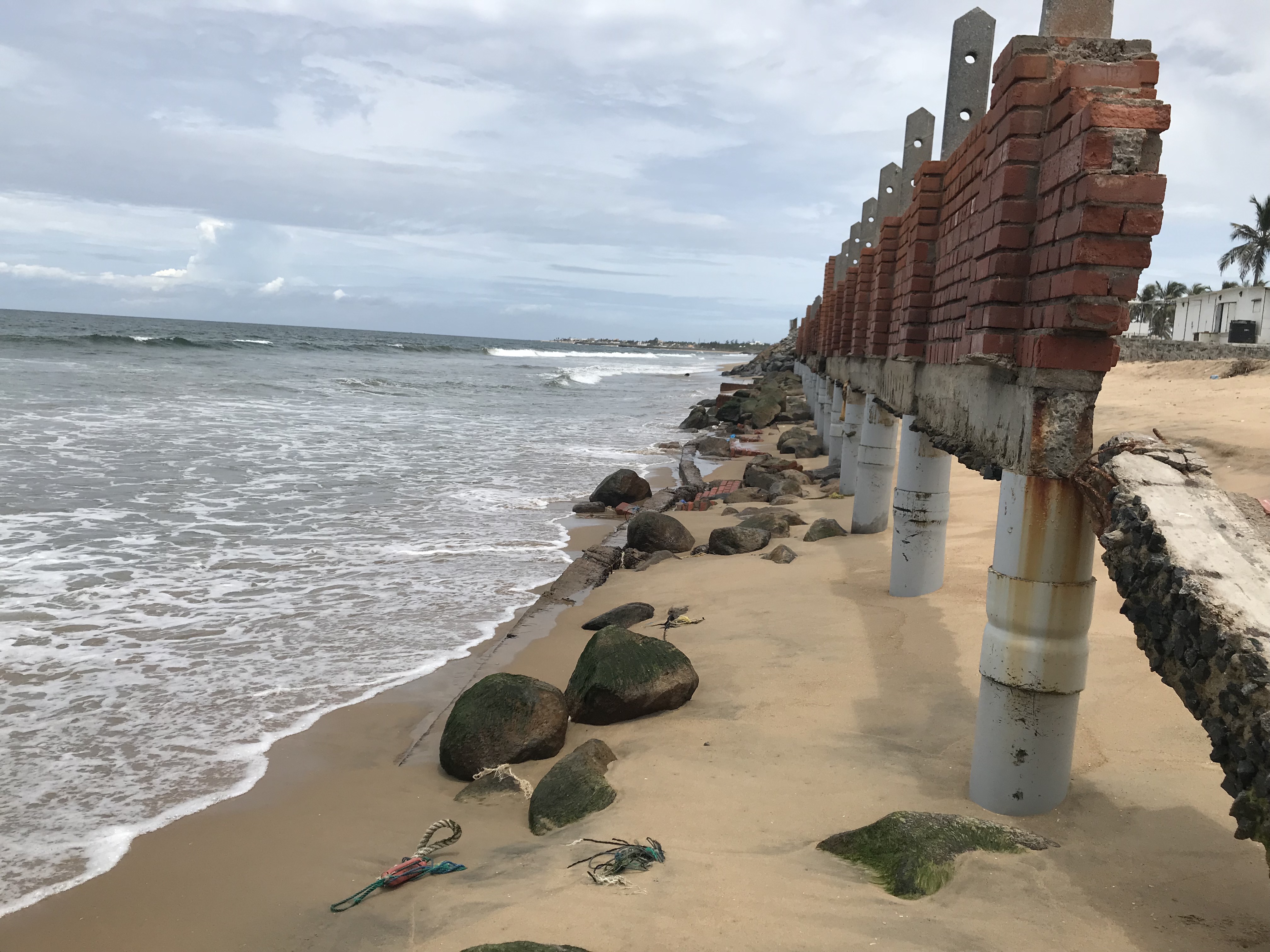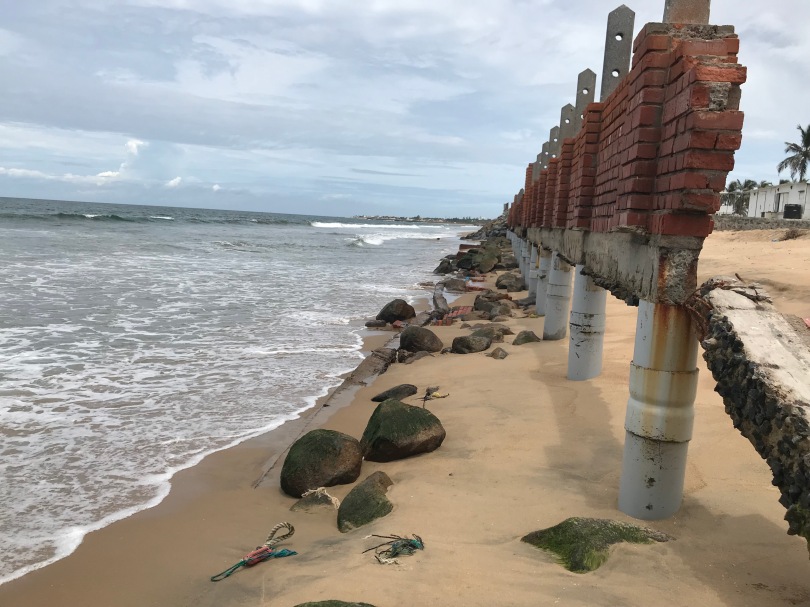

தமிழுக்கு கீழே பார்க்கவும்
25.09.2023, CHENNAI: Following the revelation of the “incomplete” CZMP maps prepared by TNSCZMA under CRZ notification 2019, the NGT stayed the public hearings that were scheduled from 18.08.2023 – 31.08.2023 in coastal districts and directed TNSCZMA on 18.08.2023 to gather necessary data including common properties and local infrastructures of fishing villages, fishing zones & fish breeding areas from the Department of Fisheries and Fishermen Welfare. However, fisherfolk have found that the Thiruvallur district collectorate collected erroneous data for Tiruvallur district in order to respond to the court’s order. Fishers who have been continuously deceived by the incomplete CZMP condemned this inappropriate action of the government and yet another time urged the government to prepare CZMPs with accurate data.
GPS data on CZMP 2019 of fishing communities collected by the Thiruvallur District Collectorate from the Forest Department, Fisheries and Fishermen Welfare dept, Public Works- Water Resources Department, Tahsildar- Ponneri & Gummidipoondi, Block Development Officer- Minjur & Gummidipoondi were shared by DEE, TNPCB at the Stakeholders meeting held on 11.09.2023 where fisherfolk participated. On field verification of the data of Tiruvallur district’s fish landing centres and schools collected from the Department of Fisheries and Fishermen Welfare, the fisherfolk found that the entire data was incorrect except for only a couple of places.
For example, when the GPS of the fish landing centre used by more than 20 fishing villages including Avurivakkam and Jamilabad was checked after the field verification by fishers, the GPS point of fish landing centre is misrepresented in Periya Mangodu kuppam, 25 km away from the on-ground location of the Pulicat fish landing centre. Also the data of location of schools is inaccurate.If the data is erroneously recorded in the CZMP as such, the livelihood of the fisherfolk will lose a huge deal of protection under the CRZ notification.
The data gathering on fishing communities’ local infrastructures like village roads, temples and associated worship spaces, toilet facilities, burial grounds, drinking water facilities; fisher communities’ common properties like Net mending and making areas on the beach, Fish auction/ sale areas on the beach, ice plants etc.; fiszhing zones & fish breeding areas are not even initiated yet.
“Pulicat fish landing centre is a very important livelihood structure for our fishing livelihood”. It is highly reprehensible to misrepresent this,” said Chandrasekhar, Vice President, Pazhaverkadu meen virpanai kootturavu ondriyam, Thiruvallur.
“Fishing villages have been fishing in Pulicat Lake for several generations using Paadu- designated fishing grounds. Fishing grounds are protected till date by appliying our traditional knowledge. But even after sending the GPS points of fishing grounds to the government, till date they are not recorded in CZMP. It is illogical to look for institutional knowledge to identify/demarcate fishing grounds rather than fisherfolk’s knowledge who fish daily,” said Durai. Mahendran, Institutional President, Tamil Nadu Fishermen Association.
“The legal battle to restore the right to livelihood of fisherfolk by means of demarcating living and livelihood spaces in CZMPs has been going on for almost 10 years from 2014 to date. It is very painful that the government is collecting such erroneous data in a hurry to respond to the court’s recent direction. The government should allocate necessary time and devise a proper procedure immediately to collect the accurate data at the district level,” said K. Bharathi, President, South Indian Fishermen Welfare Association.
For more information, contact:
K. Bharathi, President, South Indian Fishermen Welfare Association: 9444467130
Chandrasekar, Vice President, Pazhaverkadu meen virpanai kootturavu ondriyam, Thiruvallur: 9842556567
Govt Data shared in Stakeholder meeting: https://coastalresourcecentre.wordpress.com/wp-content/uploads/2023/09/data-by-govt-shared-in-stakeholder-meeting.pdf
Counter maps: Accurate data vs erroneous data given by govt: https://coastalresourcecentre.wordpress.com/wp-content/uploads/2023/09/counter-map-showing-erroneous-data-given-by-govt-1-1.pdf
செய்தி வெளியீடு
CZMP தயாரிக்க அவசரமாக பிழையான தகவல்களை அரசு சேகரிக்கிறது: இதனை கண்டித்து மீனவர்கள் சரியான முறையில் CZMP செய்ய அரசை வலியுறுத்துகின்றனர்!
25.09.2023, சென்னை: CRZ 2019 அறிவிக்கையின் கீழ் “முழுமையற்ற” வரைவு கடலோர மண்டல மேலாண்மை திட்ட வரைபடங்களை (CZMP maps) முன்வைத்து கடற்கரை மண்டல மேலாண்மை ஆணையம்(TNSCZMA) 18.08.2023 -31.08.2023 வரை அறிவித்திருந்த மக்கள் கருத்து கேட்பு கூட்டதை NGT தடை செய்து, மீனவ கிராமங்களின் சமூக கட்டமைப்புகள், பொது சொத்துகள், மீன்பிடி & மீன் இனபெருக்கம் செய்யும் இடங்கள் உள்ளிட்ட தகவல்களை TNSCZMA மீன்வளம் மற்றும் மீனவர் நலத்துறையிடமிருந்து சேகரிக்க 18.08.2023 அன்று உத்தரவிட்டது. இவ்வுத்தரவுக்கு பதிலளிக்க வேண்டி அவசரமாக திருவள்ளூர் மாவட்டத்துக்கான பிழையான தகவல்களை மாவட்ட ஆட்சியரகம் சேகரிப்பதை முழுமையற்ற CZMPயால் தொடர் வஞ்சிப்புக்கு உள்ளாகியுள்ள மீனவர்கள் கண்டறிந்து, அரசின் இப்பொறுப்பற்ற செயலை கண்டித்து சரியான முறையில் CZMPயை செய்ய மீண்டும் அரசை வலியுறுத்தினர்.
மீனவர்கள் கலந்துகொண்ட 11.09.2023 அன்று நடைபெற்ற திருவள்ளூர் மாவட்ட ஆட்சியரக அலுவலகத்தில் CZMP 2019 சார்ந்து பங்குதாரர்கள் கூட்டத்தில் வனத்துறை, மீன்வளம் மற்றும் மீனவர் நலத்துறை, பொதுப்பணித்துறை- நீர்வளத்துறை, தாசில்தார்- பொன்னேரி & கும்மிடிப்பூண்டி, வட்டார வளர்ச்சி அலுவலகம்- மீஞ்சூர் & கும்மிடிப்பூண்டி ஆகிய துறைகளிடமிருந்து மீனவ கிராமங்களின் சேகரிக்கபட்ட GPS தரவுகள் மாவட்ட சுற்றுசூழல் பொறியாளரால் பகிரப்பட்டது. மீன்வளம் மற்றும் மீனவர் நலத்துறையிடமிருந்து சேகரிக்கப்பட்ட திருவள்ளூர் மாவட்ட மீன் இறங்குதளங்கள் மற்றும் பள்ளிகளின் தரவுகளை கள ஆய்வு செய்ததில் ஓரிரு இடங்களை தவிர்த்து ஒட்டுமொத்த தரவுகளும் பிழையாக உள்ளதை மீனவர்கள் கண்டறிந்தனர்.
எடுத்துகாட்டாக, அவுரிவாக்கம், ஜமீலாபாத் உள்ளிட்ட 20க்கும் மேற்பட்ட மீனவ கிராமங்கள் உபயோகிக்கும் மீன் இறங்குதளத்தின் பகிரபட்ட GPSஐ கள ஆய்வின் பின் பொருத்தி பாரத்தபோது, பழவேற்காட்டில் காட்டவேண்டிய GPS புள்ளி, பழவேற்காட்டிலிருந்து 25 km தூரத்தில் உள்ள பெரிய மாங்கோடு பகுதியில் இருக்கிறது. மேலும் பள்ளிக்கூடங்களின் தரவுகளும் பிழையாக உள்ளன. இவ்வாறு தரவுகள் பிழையாக அப்படியே CZMPயில் பதியபட்டால் மீனவர்களின் வாழ்வாதாரம் மற்றும் வாழ்வுரிமை CRZ அறிவிக்கையின் கீழ் பெரும் பாதுகாப்பை இழக்க நேரிடும்.
மீனவ சமூக கட்டமைப்புகளில் உள்கட்டமைப்பு சாலைகள், கோயில் & வழிபாடு சார்ந்த இடங்கள், மயானங்கள், கழிவறை வசதிகள், குடிநீர் கட்டமைப்பு வசதிகள்; மீனவ கிராமங்களின் பொது சொத்துகளான வலை பின்னும் கூடங்கள், மீன் ஏலம்/ விற்பனை பகுதிகள், குளிரூட்டும் மையம்(ice plant), மீன்பிடி தளங்கள் & மீன் இனபெருக்கம் செய்யும் இடங்கள் போன்ற தரவுகள் இன்னும் சேகரிக்கக்கூடப்படவில்லை.
“பழவேற்காடு மீன் இறங்கு தளம் மீனவர்களாகிய எங்களின் வாழ்வாதாரத்திற்க்கு மிகவும் முக்கியமான வாழ்வாதார கட்டமைப்பு”. இதை தவறுதலாக காட்டுவது மிகவும் கண்டிக்கத்தக்கது” என்று சந்திரசேகர், துணை தலைவர், பழவேற்காடு மீன் விற்பனை கூட்டுறவு ஒன்றியம், திருவள்ளூர் கூறினார்.
“பழவேற்காடு ஏரியில் காலம் காலமாக மீன்பிடி பாடுகள் முறையில் மீனவ கிராமங்கள் தொழில் செய்து வருகிறோம். எங்கள் தொழில் சார்ந்த அறிவினால் இன்றுவரை மீன்பிடி தளங்களும் பாதுகாக்கபட்டு வருகிறது. ஆனால் மீன்பிடி தளங்களை GPS புள்ளிகளுடன் அரசுக்கு அனுப்பிவைத்தும் இன்றுவரை CZMPயில் பதியவில்லை. மீனவ அறிவை காட்டிலும் மீன்பிடி இடங்களுக்கு நிறுவன அறிவை தேடுவது தர்க்கமற்றது” என்று துரை.மகேந்திரன், நிறுவன தலைவர், தமிழ்நாடு மீனவ சங்கம் கூறினார்.
“2014 ஆம் ஆண்டுமுதல் இன்று வரை, கிட்டதட்ட 10 ஆண்டுகளாக தொடரும் CZMP மூலம் மீனவர்களின் வாழ்வுரிமை & வாழ்வாதார உரிமைகளை மீட்டெடுக்கும் தொடர் சட்டபோராட்டத்தில், தற்போது நீதிமன்றத்தில் CZMPக்கான மீனவ கிராமங்களின் தரவுகள் பற்றிய பதில் அளிக்க வேண்டி அவசர அவசரமாக இவ்வாறான பிழையான தரவுகளை அரசு சேகரிப்பது மிகுந்த வேதனை அளிக்கிறது. தேவையான அவகாசம் எடுத்து சரியான தரவுகளை மாவட்ட அளவில் அரசு சேகரிக்க உடனடியாக செய்முறையை வகுக்க வேண்டும்” என்று கு. பாரதி, தலைவர்,தென்னிந்திய மீனவர் நலச் சங்கம் கூறினார்.
மேலும் தகவலுக்கு, தொடர்பு கொள்ளவும்
கு. பாரதி, தலைவர்,தென்னிந்திய மீனவர் நலச் சங்கம்: 94444 67130
சந்திரசேகர், துணை தலைவர், பழவேற்காடு மீன் விற்பனை கூட்டுறவு ஒன்றியம், திருவள்ளூர் 9842556567
அரசு தரவு- பங்குதாரர் கூட்டதில் பகிரபட்டது: https://coastalresourcecentre.wordpress.com/wp-content/uploads/2023/09/data-by-govt-shared-in-stakeholder-meeting.pdf
பிழையான தரவுகள் Vs கள ஆய்வு தரவுகள் காட்டும் வரைபடம்: https://coastalresourcecentre.wordpress.com/wp-content/uploads/2023/09/counter-map-showing-erroneous-data-given-by-govt-1-1.pdf





